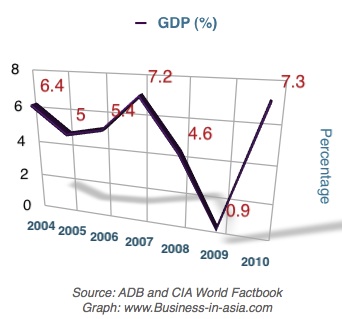Philippines
posts record GDP
growth

|
The
Philippine economy grew at its fastest pace in 2010 expanding
7.3% —
this well surpassed the government’s target of 5.0% to 6.0% and jumped
up from growth of just 0.9% in 2009, reported newspapers in the
Philippines. The Philippines seeks to attract more foreign investment
and enable the long underperforming economy to catch up with its
fast-developing Asian neighbors, said analysts.
The Philippine Star on January 10, 2011,
reported that investment is
expected to hit P610.4 billion by 2014 (2010 posted a P505 billion
investment) according to the Board of Investments (BOI)'s managing head
Cristino L. Panlilio and the Philippine Economic Zone Authority
(PEZA). The BOI said that they were hoping that investments from
the public private partnership (PPP) will boost the figure.
|
Philippines overtakes
India as top call center capital of the World
A report from IBM released in October 2010 said the Philippines had
this year passed India as the global leader in business process
outsourcing in terms of the number of people each country employed in
the sector. "For business support functions ... the
Philippines has taken over the lead in the global ranking from India,
after having challenged the top position for several years," the report
said. The IBM report did not present exact figures on how many people
each country employed in the outsourcing industry but the head of the
government’s information technology commission, Ivan Uy, said the
Philippines had definitely bypassed India in call centre revenues with
$5.5 billion last year compared with India’s $5.3 billion.
|
 |
The president of the Contact Centre Association of the Philippines,
Benedict Hernandez, also said the Philippines had more than half a
million people working in call centers and related services compared
with 330,000 in India. Hernandez said the Philippines, a former
US colony, had an advantage due to its workforce being made up of
English speakers who had accents and a culture that is closer to those
of many Western callers. Large centers can be seen in Metro Manila,
Cebu City, Davao and Angeles. According to The Economic Times,
EXL has a centre in Pasay with more than 800 employees. IBM and
Accenture are estimated to have more than 20,000. Convergys this year
announced plans to hire about 3,000 people around Manila, while Sitel
plans to hire 4,000. Aegis also acquired Philippine outsourcing company
PeopleSupport for US$250 million in 2008. Uy said even Indian companies
were setting up call centers in the Philippines to take advantage of
the Filipinos’ cultural links to the West. For example, Tata
Consultancy Services, one of the largest Indian companies in the
industry, announced in early 2011 that it had launched a business
process outsourcing operation in Manila, its first in Southeast
Asia.
Business process outsourcing call centers handle phone calls from
customers abroad, including in the fields of logistics, finance,
accounting and software research and programming, computer-aided
design, animation and graphic design, human resource management,
marketing analysis, legal processes and research, medical and legal
transcription, case writing and preparation of legal briefs. The
country’s surplus of nurses and other medical professionals can also be
harnessed for the outsourcing of health care services such as hospital
billing, management of medical health records and ‘aftercare’ of
patients, said the paper.
Some Challenges to face in
2011
Global Competitiveness Report 2010-2011 by the World Economic Forum
(WEF) showed that the Philippines placed 85th out of 139 economies for
its global Competitiveness, slightly better than 87th place out of 133
in the year before report. Even though the country competitiveness
slightly improved from last year, the country continues to lag behind
most Southeast Asian neighbors.
Apart from the rankings, respondents to the WEF survey were also asked
to select the five most problematic factors for doing business in their
country, on a list of 15 factors. The top most problematic factors for
doing business in the Philippines according to the report are:
corruption, inefficient government bureaucracy, inadequate supply of
infrastructure, policy instability and tax regulations.
The Aquino administration plans to double the Philippines’
infrastructure investments in the next six years by tapping the private
sector, as well, according to the National Economic and Development
Authority (NEDA). Based on the agency’s input to the State of the
Nation Address of President Benigno Aquino 3rd, the new government will
raise investments to a range of 25 percent to 28 percent of gross
domestic product for the period 2011 to 2016, from the current 14
percent. To achieve this, NEDA said the government will increase
spending on public infrastructure through greater private sector
participation.
NEDA said the government aims to modernize the transportation sector
and the logistics system for efficient movement of goods and people.
The government plans to develop tourism infrastructure to provide
access to major tourism destinations and spread economic development to
other regions aside from Metro Manila.
To improve the Philippines’ competitiveness, the Aquino administration
also aims to reduce the cost of electricity, thereby reducing
manufacturing costs in the country.
NEDA said the government will enact a competition law and create a
competition body to foster a culture of competition and enhance
economic efficiency for job creation.
Other priorities for the next six years are promoting anti-corruption
through legislative action, administrative measures and wider
collaboration with the public; improving health services and social
protection services and increasing exports through diversification and
trade agreements.
|

